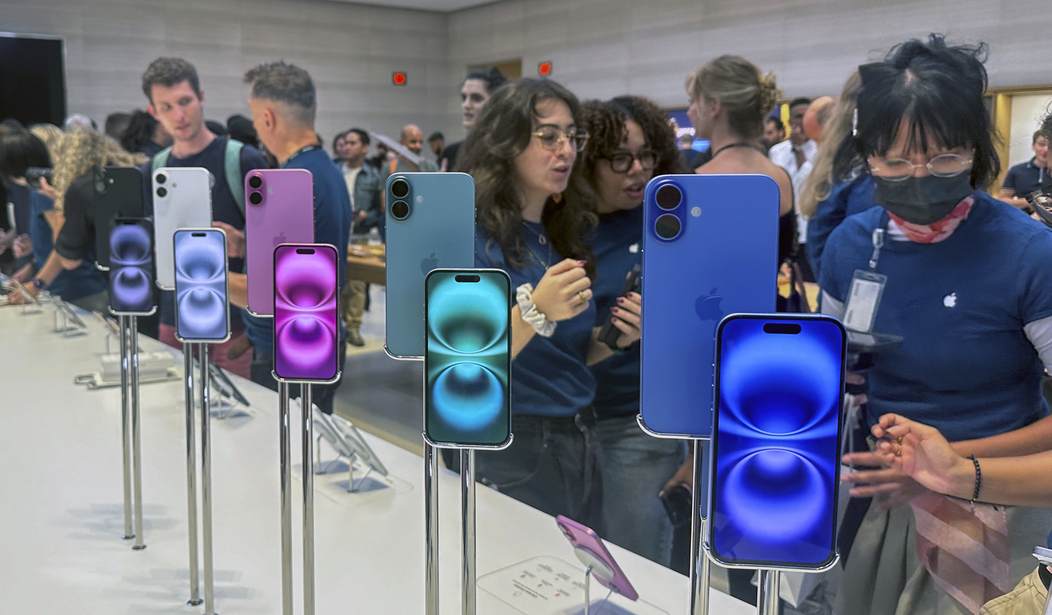Don't rush to the store to buy that new iPhone just yet. After a week of volatility in the markets over Donald Trump's tariffs, investors mainly returned to normal by the end of the week, ending on a positive upswing on Friday. The one exception was among tech stocks such as Apple, where tariffs would hit their supply chains hard.
Until late last night, that is. Trump has repeated his exemption to tariffs on higher-end electronics that he applied in the first term against China, according to US Customs and Border Patrol:
Smartphones, laptop computers, memory chips and other electronics will be exempt from President Trump’s sweeping tariffs on China, according to new guidance from the administration, in another step back that could ease some consumer concerns about an immediate spike in costs for electronic products.
The guidance, published Friday night by the U.S. Customs and Border Protection, also exempts machines used to create semiconductors, flat screen TVs, tablets and desktop computers from Trump’s 125% China tariff and his 10% baseline tariff on countries around the world.
The baseline tariff on these items still applies, according to the New York Times. That's the ten-percent threshold tariff on all trade as well as the additional twenty percent that Trump applied to China over fentanyl trafficking. The punitive tariffs that Trump escalated specifically on China the previous week will be exempted on these classes of imports, however:
A message posted late Friday by U.S. Customs and Border Protection included a long list of products that would not face the reciprocal tariffs President Trump imposed in recent days on Chinese goods as part of a worsening trade war. Apart from smartphones and laptop computers, the exclusions would also apply to transistors and semiconductors, which are largely not made in the United States.
Some tariffs will still apply to electronics and smartphones. The Trump administration had applied a tariff of 20 percent on Chinese goods earlier this year because of its role in the fentanyl trade.
The USCBP message gives some inadvertent testimony to the volatility of these policies over the past two weeks:
The purpose of this message is to provide further guidance on the additional duties due on imported merchandise which were imposed by Executive Order 14257, issued April 2, 2025, and published in the Federal Register Notice, “Regulating Imports with a Reciprocal Tariff to Rectify Trade Practices that Contribute to Large and Persistent Annual United States Goods Trade Deficits,” 90 FR 15041 (Apr. 7, 2025), as amended by Executive Order 14259, issued on April 8, 2025, “Amendment to Reciprocal Tariffs and Updated Duties as Applied to Low-Value Imports from the People’s Republic of China,” and as further amended by the Executive Order dated April 9, 2025, “Modifying Reciprocal Tariff Rates to Reflect Trading Partner Retaliation and Alignment.”
That's a lot of changes in a short period of time.
So what led to this new set of exemptions? As the NYT notes, Trump largely exempted this sector in the first term when he escalated tariffs on China, so it's not necessarily inconsistent. However, if Trump had applied these exemptions on Liberation Day, Apple stock (to use one example) may not have fallen from $223.89 a share on April 1 to $172.42 on April 8. It rebounded on Friday to close the week at $198 and some change, but it's still 10% down over the last two weeks. Likewise, Samsung lost a significant amount of value over the last fortnight, and tech in general got ravaged.
This should help boost share prices on Monday, and might even help the overall market. But it's a curious place to carve out an exemption, politically speaking. It leaves punitive tariffs in place for a lot of other items that families of more modest means will struggle to buy with higher prices, one friend reminds me. Most garlic consumed in the US comes from China, for instance, and families with small children need to buy shoes, car seats, and strollers, none of which will get exempted from tariffs on China. These exemptions would appear to benefit American consumers with more disposable income over those with less. And it's the high-tech supply lines that Trump says he most wants to have re-homed to the US as well.
One has to wonder whether this is intended as a signal to China on negotiations. Trump may wait to see whether Xi Jinping offers a reciprocal concession to signal back a willingness to talk. This kind of move makes sense in that context, so perhaps the best choice will be to wait a few days to see whether Xi responds to this potential opening. And, of course, don't rush to replace your electronics in the meantime.








Join the conversation as a VIP Member